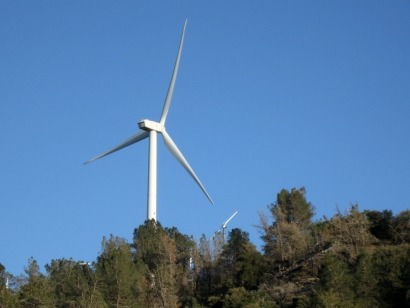
The Energy and Climate Change Secretary, Ed Davey, will oppose new EU goals on increasing the share of renewable energy in Europe but will instead push for tougher climate change goals focused on curbing greenhouse gas emissions by 2030.
EU targets aimed at generating 20 percent of energy demand from renewable sources have so far been credited with encouraging huge growth in the sector creating tens of thousands of jobs directly with more jobs in the supply chain and throughout the wider economy. However, Chancellor George Osborn has opposed new renewable energy targets preferring instead a “dash for gas” with plans for new gas-fired power stations to be built over the next decade. Green groups have said in opposition to this idea that such a plan would jeopardise attempts to tackle climate change and argue that renewable energy generation should be scaled up dramatically. Voices within the renewable sector itself have said that any move away from new renewable energy targets will create uncertainty within the market thereby encouraging companies and investors to look elsewhere rather than supporting the UK renewables sector.
“If the Government does not send the right signals, then major international companies deciding where to build their big wind turbine factories will go elsewhere” said Robert Norris of Renewable UK. “We can't afford to let this opportunity slip through our fingers. It's absolutely vital to set targets on emissions and renewables for 2030 as soon as possible. The wind industry urgently needs long-term clarity to attract the billions of pounds of investment to build the massive next round of offshore projects that will create tens of thousands of jobs.”
The Liberal Democrats have had to agree to a compromise with their Conservative partners in order to get the climate change targets pushed through. It meant relinquishing a goal for a set quantity of energy to come from renewable sources by 2030. Many Conservative MP’s, some of them suspected of being climate change sceptics, have opposed renewable energy policies, particularly concerning wind farm deployment. This has forced the Energy Secretary to concentrate on climate change targets instead.
“The UK is a global leader in tackling climate change” said Ed Davey. “That is why we will argue for an EU-wide binding emissions reductions target of 50% by 2030 in the context of an ambitious global climate deal and even a unilateral EU 40% target without a global deal. This 2030 target is ambitious, but it is achievable and necessary if we are to limit climate change to manageable proportions. We want to maintain flexibility for member states in how they meet this ambitious emissions target. There are a variety of options to decarbonise any country's economy. In the UK, our approach is technology neutral and our reforms will rely on the market and competition to determine the low carbon electricity mix. We will therefore oppose a renewable energy target at an EU level as inflexible and unnecessary.”
However the decision has angered environmental groups and investors alike. David Kennedy, the Chief Executive of the Committee on Climate Change – the government’s advisory body on emissions targets – pointed out that the government’s preference for a “dash for gas” is destroying the confidence of investors, particularly in the renewables sector. Meanwhile, Ruth Davis, the political adviser for Greenpeace UK, said that in choosing to oppose a renewables target “the irrational prejudices of the Tory right seem to have trumped the interests of working people in Britain.”
The Department of Energy and Climate Change (DECC) will be pushing for an urgent structural reform of the European Emissions Trading Scheme (ETS) to ensure it continues to incentivise investment in low carbon. It will also push for a unilateral EU target of 40 percent greenhouse gas (GHG) reduction on 1990 levels by 2030 and believes that the best approach to tackling climate change is through a binding GHG target and a strong ETS with flexibility for member states to decarbonise in the least costly way.
Further information:

